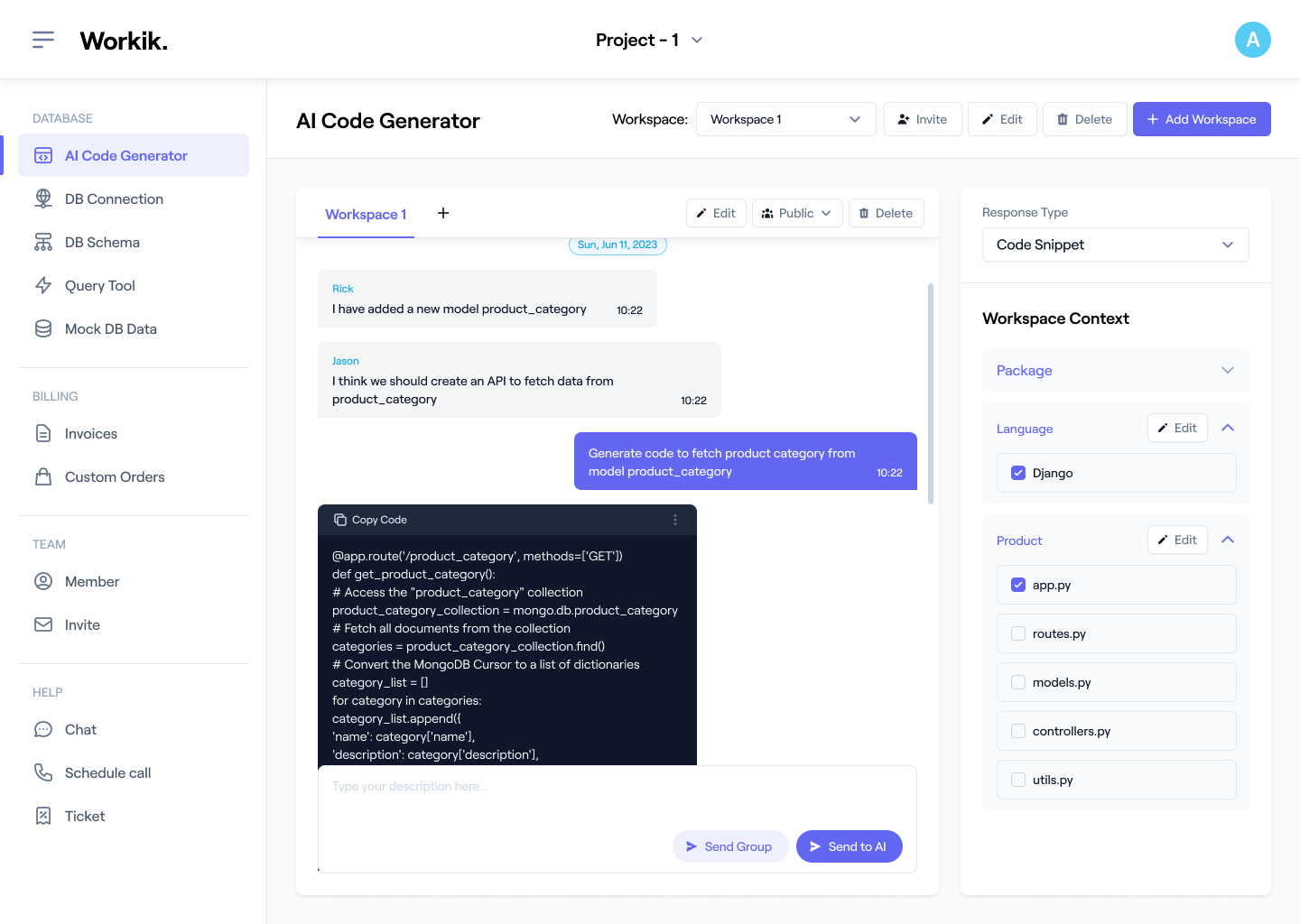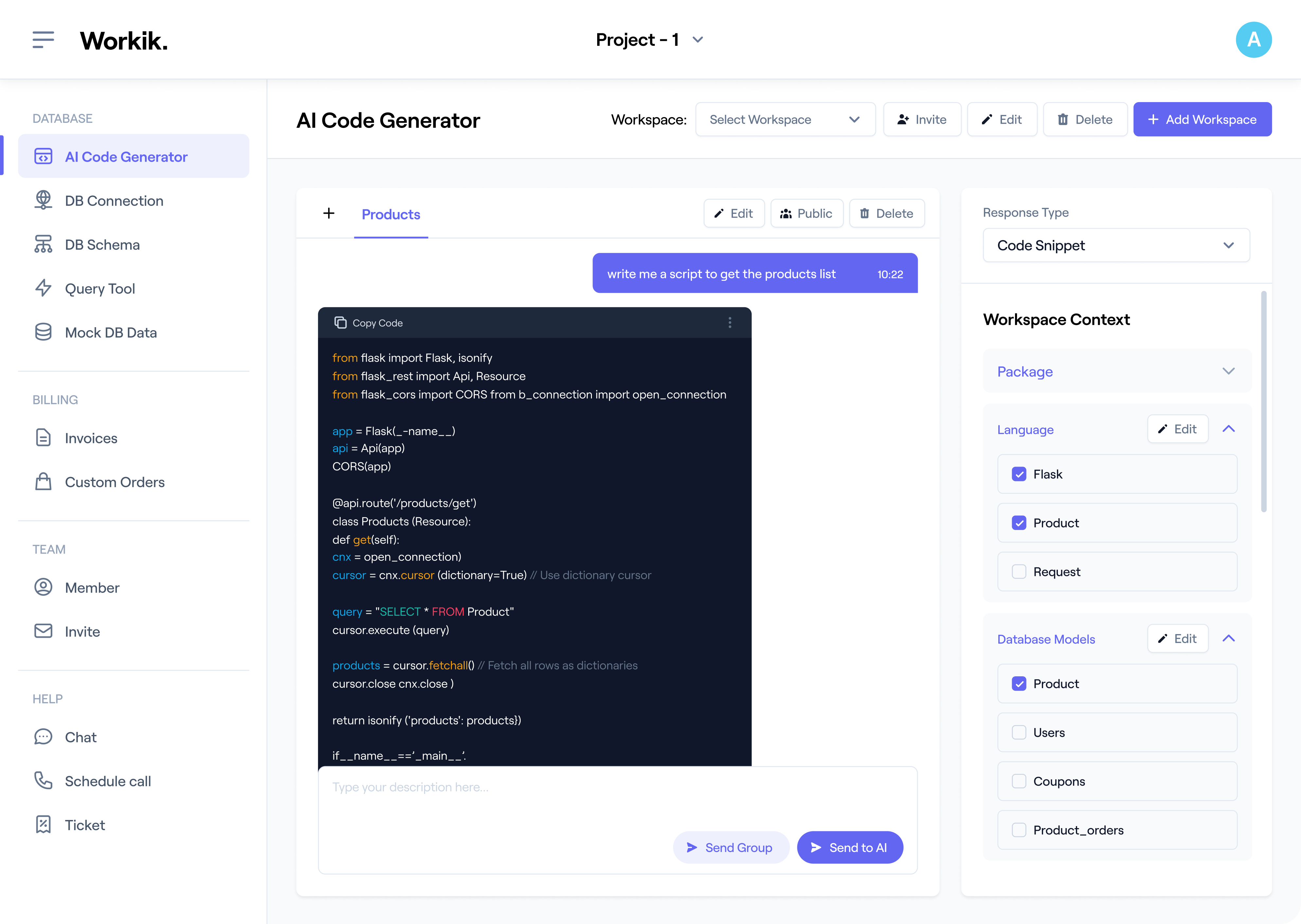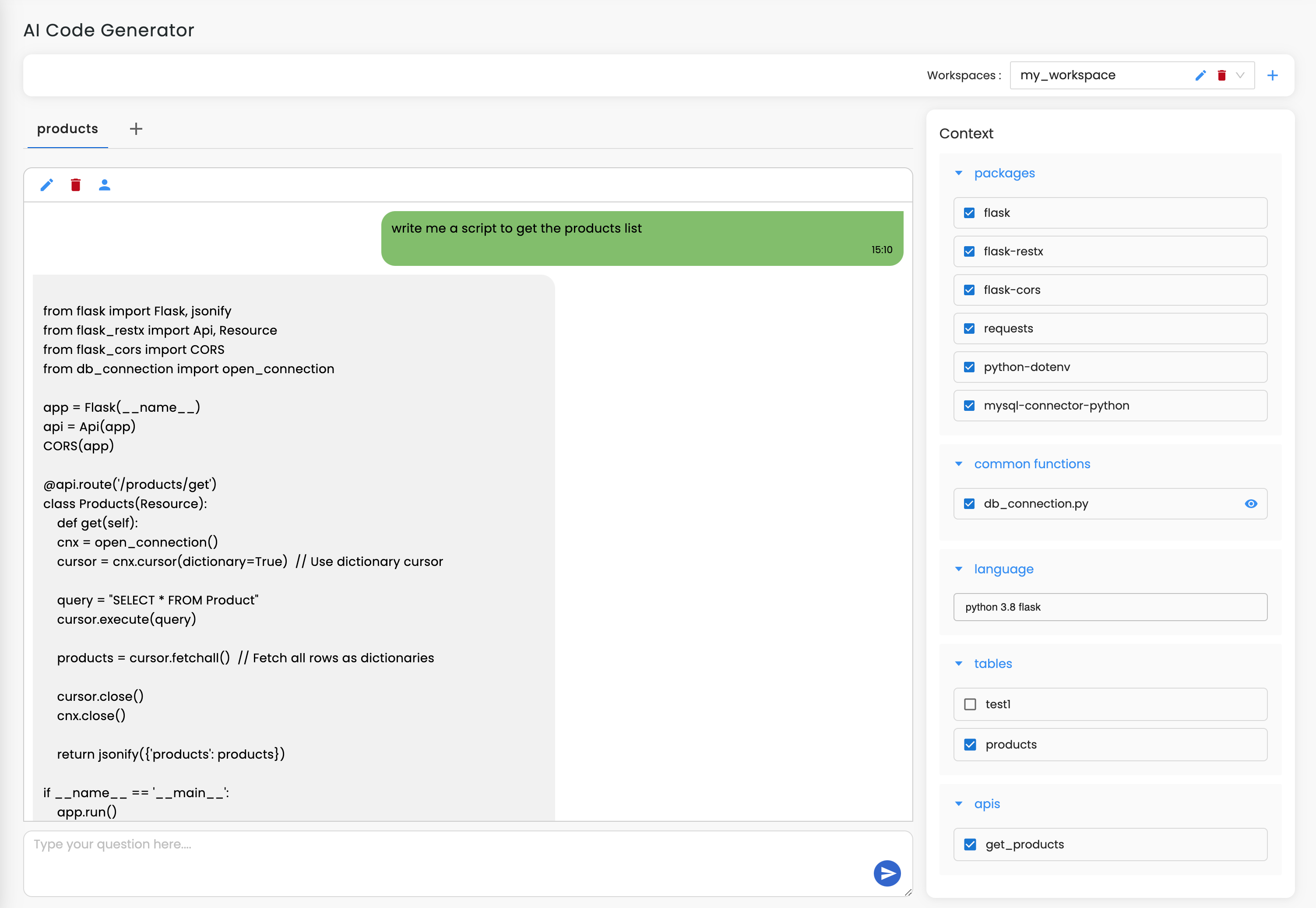
Join our community to see how developers are using Workik AI everyday.
Features

Efficient Data Modeling
AI can craft optimized data models, defining CouchDB structures and relationships for PouchDB and React Native.

Instant Query Optimization
Use AI to seamlessly generate high-performance queries with Mango and MapReduce. Suggests indexes for large datasets.

Automated Schema Updates
AI adapts schemas as requirements shift to keep structures synced across environments for Nano and Express.js.

Visualize Data Relationships
AI intelligently assists in generating ER diagrams, identifying overlaps, and optimizing data flow efficiently with Apache Nifi.
How it works
Create your Workik account or sign in with Google to start building optimized CouchDB data models and queries with AI.
Import your CouchDB schema and sync projects from GitHub, GitLab, or Bitbucket. Define documents, fields, and relationships for AI-driven query generation.
Leverage AI to design, debug, and test complex CouchDB queries. Optimize query performance with indexing, efficient filtering, and data aggregation techniques.
Invite your team to collaborate in real-time, refining data models and query structures. Use AI to ensure optimal data flow, performance, and deployment readiness.


Expand
.png)
.png)
Expand


Expand


Expand


Expand


Expand


Expand


TESTIMONIALS
Real Stories, Real Results with Workik
Workik AI makes CouchDB data modeling intuitive. The automated schema updates are a game-changer!

Carlos Mendoza
Lead Developer
With Workik’s AI, our CouchDB queries are optimized in seconds—no more manual tuning!

Leah Kim
Software Engineer
AI-driven ER diagrams and seamless query generation in CouchDB? Workik has made it effortless!

Oliver Hayes
Solutions Architect
What are the popular use cases of Workik's AI for CouchDB data modeling and query generation?


Some popular use cases of Workik's AI-powered CouchDB Data Modeling and Query Generator for developers include:
* Generate CouchDB code for content management, collaboration tools, and dashboards.
* Automate backends for products, inventory, and transactions with optimized queries.
* Build scalable backends for profiles, posts, comments, and file storage in CouchDB.
* Create MapReduce functions for data aggregation and real-time analytics.
* Set up CouchDB replication for offline apps and data consistency across devices.
* Generate optimized RESTful APIs for seamless CouchDB integrations.
* Refine complex Mango queries for high-performance data retrieval.
What kind of context can I add in Workik AI related to CouchDB data modeling and query generation?


Setting context in Workik is optional but enhances AI-generated CouchDB queries. Here are the types of context you can add:
* Database schema (import documents and relationships from GitHub, GitLab, or Bitbucket)
* Programming languages (e.g., JavaScript and backend frameworks like Node.js)
* Libraries or tools (e.g., PouchDB, Nano, or Express.js for smoother integration)
* Data constraints (e.g., specifying indexes and unique fields in documents)
* API blueprints (e.g., Postman or Swagger for connecting CouchDB with external services)
How can Workik AI help me manage CouchDB database migrations and restructuring?


Workik AI analyzes the current document structure and suggests optimized paths for migrating or restructuring data, ideal for scaling or redesigning applications. For instance, if you’re moving from a single-document model to a more complex one, AI will guide adjustments to document relationships, indexing, and replication configurations.
Can Workik AI assist with complex CouchDB query optimization for analytics applications?


Yes, Workik AI excels at crafting efficient queries by building views for aggregating and filtering large datasets. For example, if you’re implementing real-time dashboards, AI can help by setting up Mango Query views that refresh instantly, reducing latency, and enhancing live data interactions for end-users.
Does Workik AI support CouchDB-based ETL (Extract, Transform, Load) processes?


Absolutely. Workik AI assists in setting up CouchDB as part of ETL workflows by generating queries that extract relevant data, transform it, and load it into target databases or systems. This is ideal for data integration projects where CouchDB data needs to sync with other databases or analytics platforms.
How does Workik AI handle query generation for CouchDB data replication in distributed environments?


Workik AI can assist by generating CouchDB queries designed for synchronization across distributed databases. For example, in a multi-region application, AI helps establish replication filters and conflict resolution queries, ensuring data consistency across regions.
Can Workik AI help with CouchDB indexing strategies for complex search requirements?


Yes, AI-driven indexing strategies are valuable for applications requiring custom searches within CouchDB. For instance, if you’re building an application that needs full-text search or multi-field filtering, AI can suggest specific indexing configurations and create views that handle these searches effectively.
Generate Code For Free

CouchDB: Question and Answer
CouchDB is an open-source NoSQL database that uses a document-oriented model and JSON to store data, making it highly scalable and flexible for web applications, mobile applications, and offline-first solutions. CouchDB supports distributed architectures with replication, synchronization, and conflict resolution, allowing smooth data exchange across devices and servers.
Popular frameworks and libraries used with CouchDB include:
ORMs:
PouchDB, Nano
Data Access:
Cradle, Hoodie.js
Backend Frameworks:
Express.js, Koa, Hapi
Real-Time Synchronization:
Couchbase Lite, React Native
Frontend Frameworks:
React, Angular
Testing Tools:
Mocha, Jest
Mobile Applications:
CouchDB's offline-first approach and sync capabilities make it ideal for local data storage and synchronization.
Web Applications:
Store user sessions, product data, and activity logs with CouchDB’s JSON-based document model.
Real-Time Collaboration Tools:
Use CouchDB’s replication features to sync data across devices like shared document editors or chat applications.
IoT Data Storage:
Manage and sync data generated by IoT devices, leveraging CouchDB’s ability to handle unstructured data.
Content Management Systems (CMS):
Use CouchDB to store content for CMS applications, providing flexibility in content storage and access.
Career opportunities and technical roles available for professionals skilled in CouchDB include NoSQL Database Administrator, Backend Developer, Data Engineer, Full Stack Developer, Cloud Architect, DevOps Engineer, and IoT Solutions Developer.
Query Generation:
Create optimized CouchDB queries for complex filtering, sorting, and aggregation tasks.
Performance Optimization:
Suggest indexing strategies, optimize query filters, and streamline document retrieval.
Data Modeling:
Design document structures and relationships with AI-driven insights on schema best practices.
Data Synchronization:
Configure queries for real-time data sync across distributed systems, ideal for mobile and multi-device applications.
Conflict Resolution:
Set up conflict resolution queries, ensuring consistent data across distributed databases.
Testing and Debugging:
Generate query variants and test for consistency, scalability, and performance across different environments.
Explore more on Workik
Get in touch
Don't miss any updates of our product.
© Workik Inc. 2026 All rights reserved.

